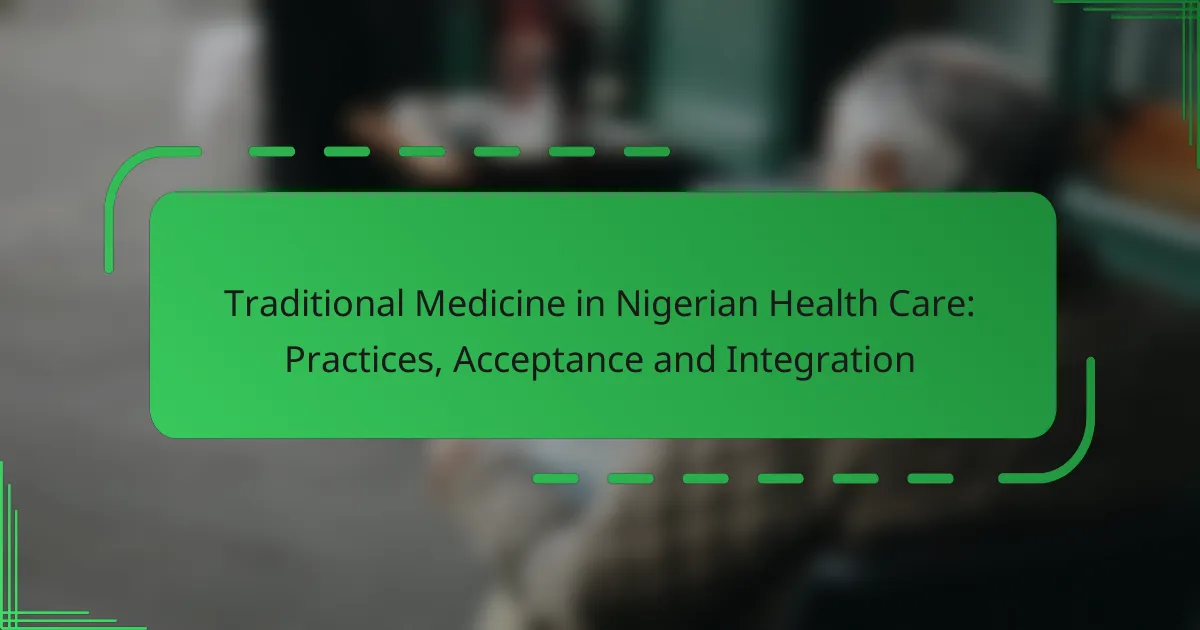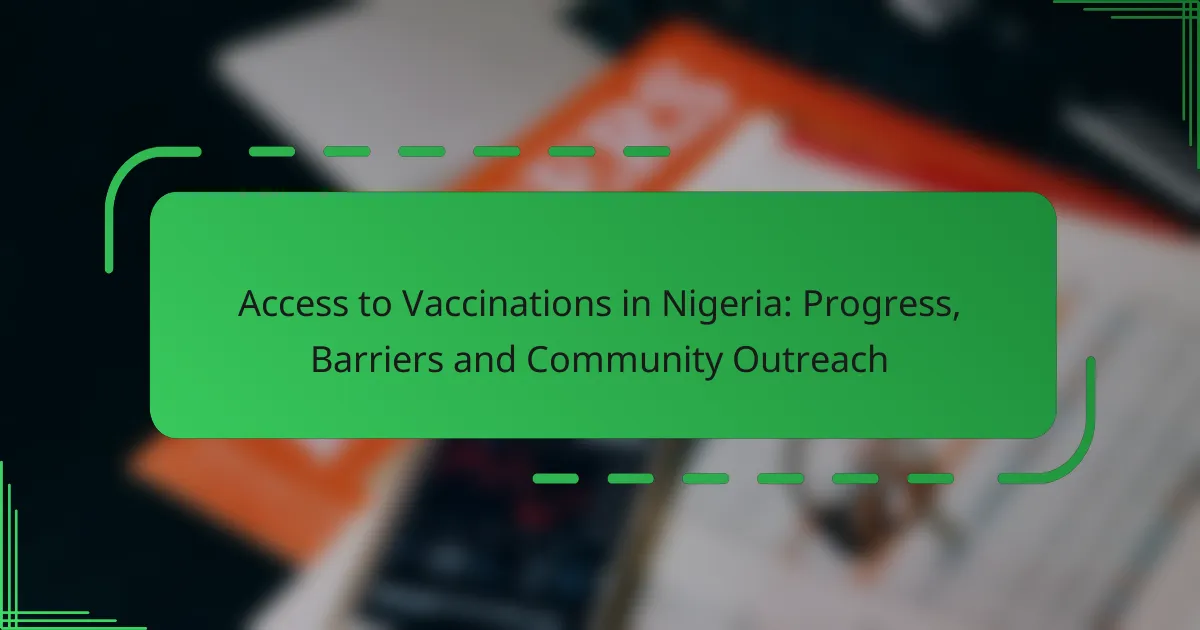Traditional medicine in Nigeria plays a vital role in health care, encompassing diverse healing methods such as herbal remedies and spiritual practices deeply rooted in cultural beliefs. Widely accepted by the population, these practices often complement modern healthcare, as many individuals turn to traditional healers for their health needs. The integration of traditional medicine into the healthcare system can enhance patient satisfaction and improve overall health outcomes by blending the strengths of both approaches.
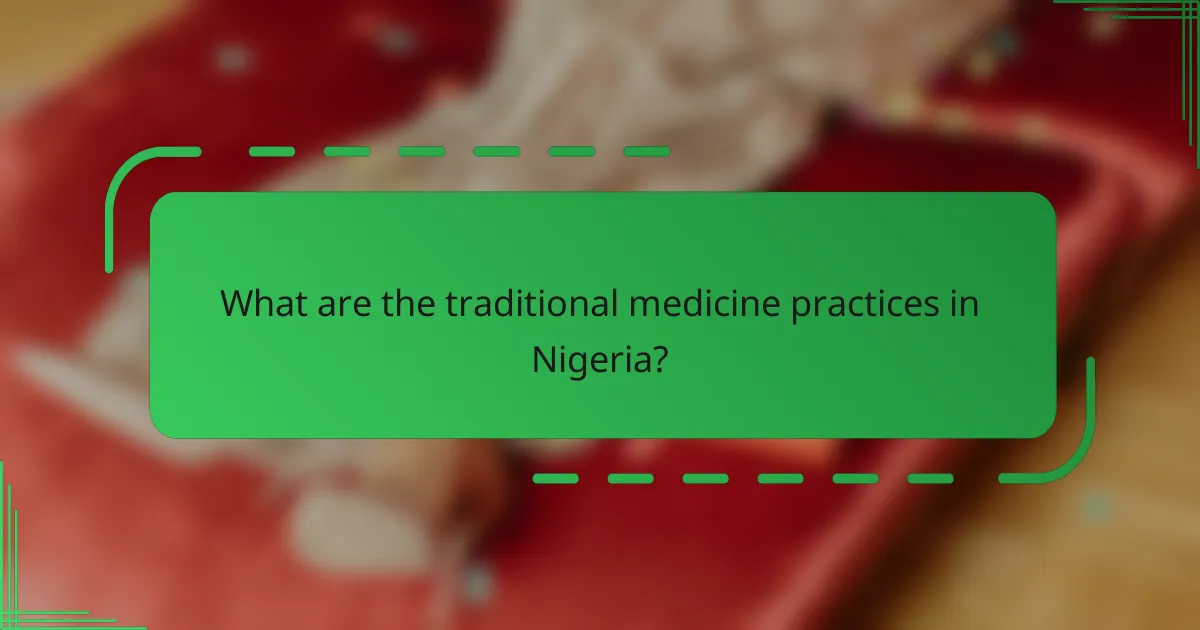
What are the traditional medicine practices in Nigeria?
Traditional medicine practices in Nigeria encompass various healing methods rooted in cultural beliefs and local knowledge. These practices include herbal remedies, spiritual healing, and other techniques that have been passed down through generations.
Herbal medicine
Herbal medicine is a cornerstone of traditional healing in Nigeria, utilizing plants and natural substances to treat various ailments. Practitioners often prepare remedies from local herbs, roots, and barks, which are believed to possess medicinal properties.
Common herbs used include ginger, garlic, and various leaves, each selected for specific health benefits. For example, bitter leaf is frequently used to manage diabetes and hypertension.
Spiritual healing
Spiritual healing involves the belief that health issues can be linked to spiritual factors, such as ancestral spirits or supernatural forces. Healers often conduct rituals, prayers, and sacrifices to restore balance and harmony to the individual.
This practice may include consultations with diviners who diagnose ailments based on spiritual insights. It is essential for practitioners to build trust with their clients, as spiritual healing relies heavily on personal beliefs and cultural context.
Bone setting
Bone setting is a traditional practice where healers manipulate and realign broken or dislocated bones without surgical intervention. This technique is often sought after when modern medical facilities are inaccessible or when patients prefer traditional methods.
Bone setters typically use their hands to apply pressure and guide the bones back into place, followed by herbal poultices to aid healing. It is crucial for patients to ensure that the bone setter has a good reputation and experience to avoid complications.
Massage therapy
Massage therapy in Nigeria often combines physical manipulation with traditional beliefs about energy flow and wellness. Practitioners use various techniques to relieve pain, improve circulation, and promote relaxation.
Common methods include deep tissue massage and gentle strokes, often accompanied by the application of herbal oils. Regular sessions can help alleviate stress and tension, making it a popular choice among individuals seeking holistic care.
Traditional birth attendants
Traditional birth attendants (TBAs) play a vital role in maternal health care in Nigeria, especially in rural areas where access to hospitals may be limited. TBAs provide prenatal, delivery, and postnatal care, often relying on their extensive experience and cultural knowledge.
While TBAs are respected figures in their communities, it is essential for expectant mothers to consider the availability of emergency medical services and to seek professional care when complications arise during childbirth.
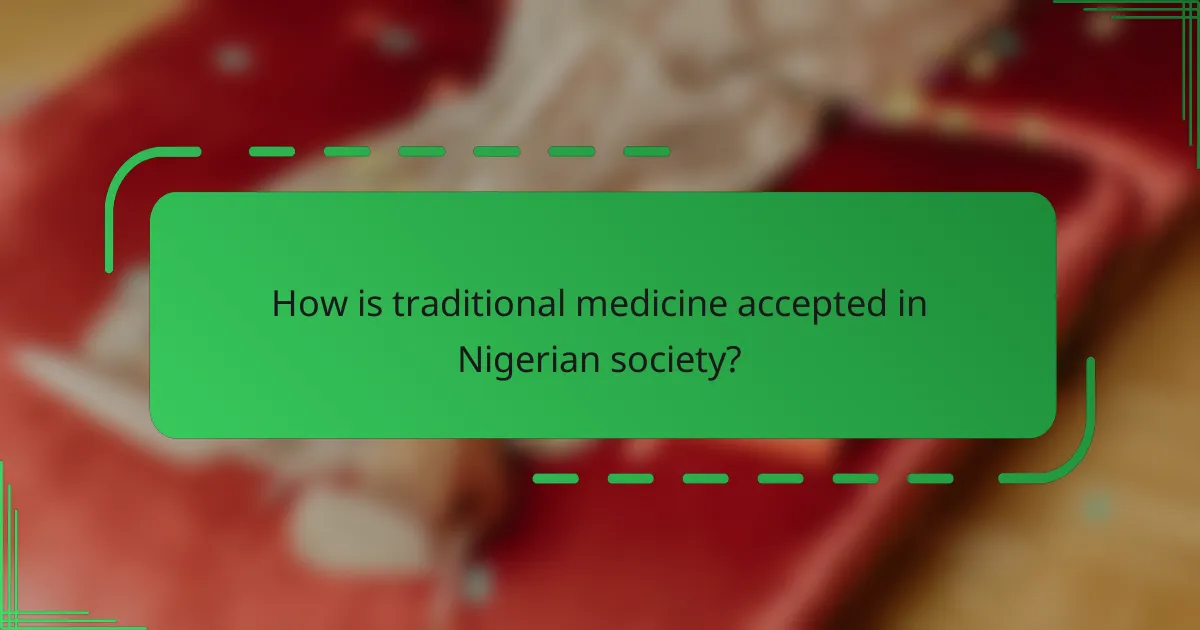
How is traditional medicine accepted in Nigerian society?
Traditional medicine is widely accepted in Nigerian society, often seen as a complementary approach to modern healthcare. Many individuals rely on traditional healers for various ailments due to cultural beliefs and the accessibility of these practices.
Community trust
Community trust plays a significant role in the acceptance of traditional medicine in Nigeria. Many people have deep-rooted faith in local healers, often viewing them as more relatable than modern medical practitioners. This trust is built on personal experiences and the healer’s reputation within the community.
Traditional healers are often seen as custodians of cultural heritage, which enhances their credibility. Their knowledge of local herbs and remedies is passed down through generations, reinforcing the community’s reliance on their expertise.
Integration with modern medicine
Integration of traditional medicine with modern healthcare is increasingly common in Nigeria. Many healthcare facilities now recognize the importance of traditional practices and may refer patients to traditional healers when appropriate. This collaborative approach can enhance patient care by combining the strengths of both systems.
However, challenges remain, such as a lack of standardized practices among traditional healers and varying levels of education. Efforts to create guidelines for integrating these two systems are ongoing, aiming to improve safety and efficacy for patients.
Influence of culture
Cultural beliefs significantly influence the acceptance of traditional medicine in Nigeria. Many communities view health as a holistic concept, where physical, spiritual, and social factors are interconnected. This perspective often leads individuals to seek traditional remedies alongside or instead of conventional treatments.
Rituals and spiritual practices are commonly associated with traditional healing, further embedding these practices in the cultural fabric. For instance, certain herbs may be used not just for their medicinal properties but also for their symbolic significance in healing rituals.

What are the benefits of integrating traditional medicine into health care?
Integrating traditional medicine into health care offers numerous benefits, including enhanced patient satisfaction and improved health outcomes. This approach combines the strengths of both traditional and modern medical practices, making health care more holistic and culturally sensitive.
Cost-effectiveness
Integrating traditional medicine can significantly reduce health care costs for patients and the system. Traditional remedies often utilize locally available resources, which can be less expensive than pharmaceuticals. For instance, herbal treatments may cost a fraction of the price of conventional medications.
Moreover, traditional medicine can alleviate the burden on public health facilities by providing effective treatments for common ailments, thus reducing the need for expensive hospital visits. This dual approach can lead to overall savings in health care expenditures.
Accessibility in rural areas
In Nigeria, traditional medicine is often more accessible than modern health care, especially in rural areas where hospitals may be scarce. Traditional healers are typically part of the community and can provide immediate care without the need for long travel distances.
This accessibility ensures that even those with limited financial resources can receive treatment. By integrating traditional practices, health care systems can reach underserved populations more effectively, improving overall health outcomes in these regions.
Cultural relevance
Traditional medicine holds significant cultural importance in Nigeria, as it is deeply rooted in the beliefs and practices of various communities. Integrating these practices into health care respects and acknowledges the cultural identities of patients, fostering trust and cooperation.
When health care providers incorporate traditional methods alongside modern treatments, they create a more inclusive environment. This approach not only enhances patient engagement but also encourages adherence to treatment plans, as patients feel their cultural practices are valued and respected.
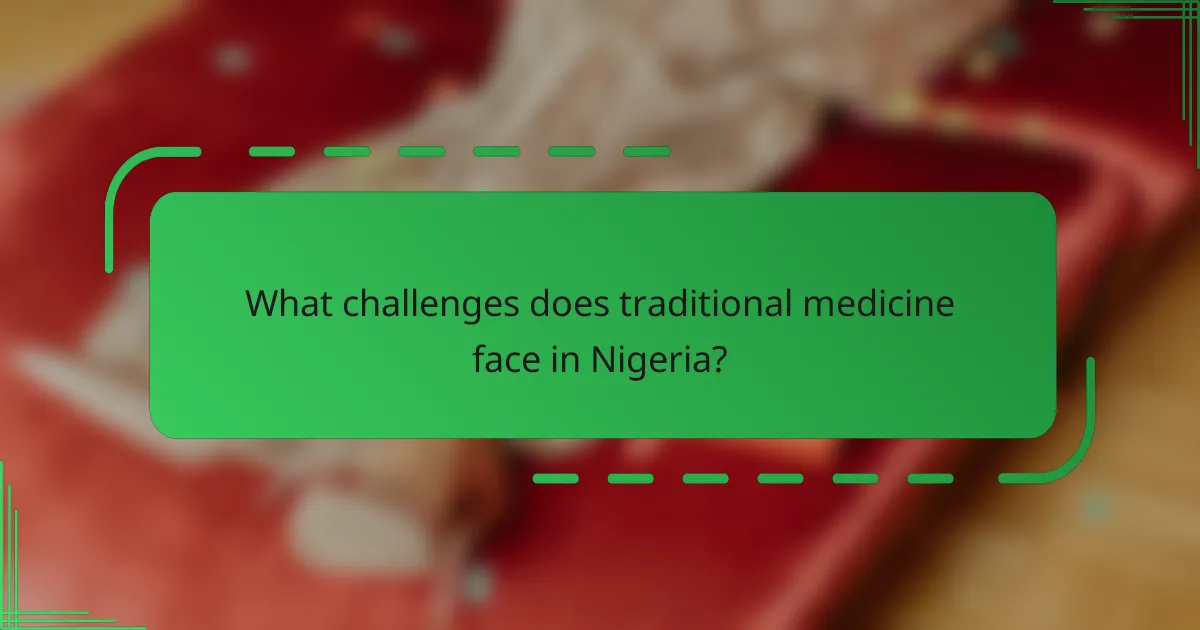
What challenges does traditional medicine face in Nigeria?
Traditional medicine in Nigeria encounters several significant challenges that hinder its broader acceptance and integration into the healthcare system. Key issues include a lack of regulation, stigmatization by the public and healthcare professionals, and limited scientific validation of practices.
Lack of regulation
The absence of formal regulation for traditional medicine practitioners in Nigeria creates a landscape where quality and safety can vary widely. Without oversight, there is no standardized training or certification process, making it difficult for patients to discern qualified practitioners from those who may not adhere to safe practices.
This lack of regulation can lead to the use of ineffective or harmful treatments, which can further erode public trust in traditional medicine. Establishing a regulatory framework could help ensure that practitioners meet certain standards, thereby enhancing the credibility of traditional medicine.
Stigmatization
Stigmatization of traditional medicine is prevalent in Nigeria, often driven by a preference for Western medical practices among healthcare professionals and the public. Many view traditional healers as unscientific or inferior, which can discourage individuals from seeking traditional treatments even when they may be effective.
This negative perception can limit collaboration between traditional and modern healthcare systems, preventing a more holistic approach to patient care. Efforts to educate the public about the benefits and potential of traditional medicine could help reduce stigma and promote acceptance.
Limited scientific validation
Many traditional medicine practices lack rigorous scientific validation, which poses a challenge for acceptance within the broader healthcare community. While some herbal remedies may have proven efficacy, others remain untested, leading to skepticism among healthcare providers.
To address this issue, research initiatives that focus on scientifically validating traditional remedies are essential. Collaborations between traditional healers and researchers could facilitate studies that provide evidence of effectiveness, potentially bridging the gap between traditional and modern medicine.
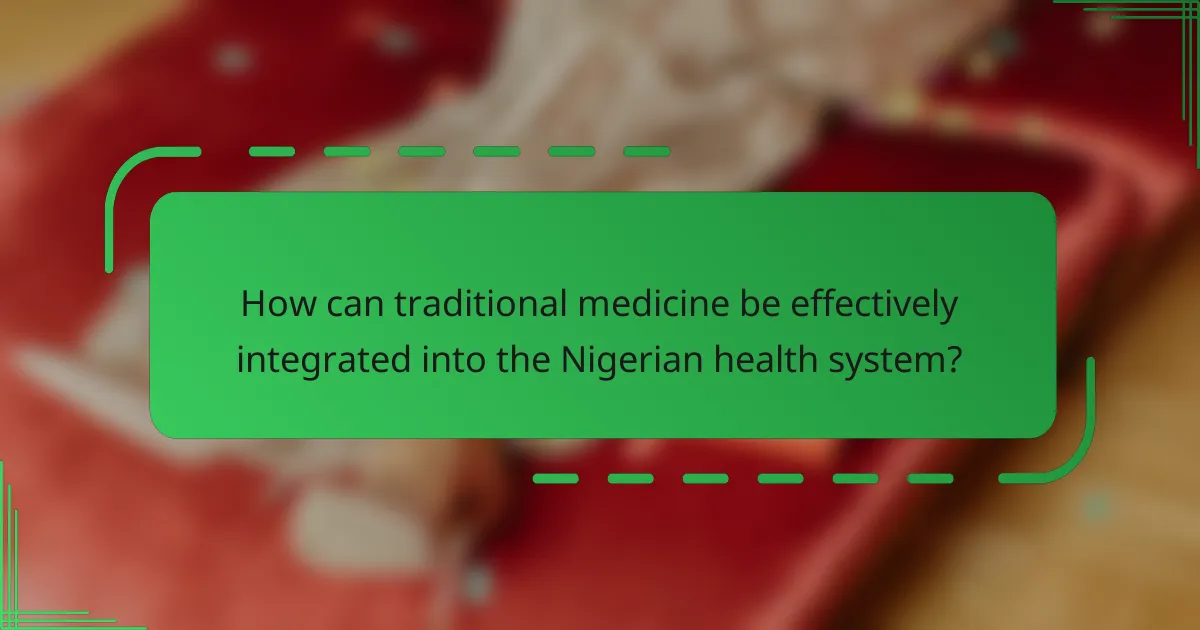
How can traditional medicine be effectively integrated into the Nigerian health system?
Effective integration of traditional medicine into the Nigerian health system requires a multi-faceted approach that includes policy frameworks, training for practitioners, and public awareness campaigns. This ensures that traditional practices complement modern healthcare, enhancing overall patient outcomes.
Policy frameworks
Establishing robust policy frameworks is crucial for the integration of traditional medicine into Nigeria’s health system. These frameworks should outline the roles and responsibilities of traditional healers, ensuring they operate within a regulated environment that prioritizes patient safety.
Policies should also promote collaboration between traditional and modern healthcare providers, facilitating referrals and shared patient care. This can help to build trust among patients and healthcare professionals, leading to better health outcomes.
Training for practitioners
Training programs for traditional medicine practitioners are essential for ensuring they are equipped with the necessary skills and knowledge. These programs should cover topics such as ethics, patient care, and the scientific basis of herbal remedies, enabling practitioners to provide safe and effective treatments.
Collaboration with universities and health institutions can enhance training quality. Incorporating evidence-based practices into traditional medicine training can bridge the gap between traditional and modern healthcare approaches.
Public awareness campaigns
Public awareness campaigns play a vital role in educating the community about the benefits and limitations of traditional medicine. These campaigns should aim to inform the public about safe practices and the importance of consulting healthcare professionals when seeking treatment.
Utilizing various media channels, including social media, radio, and community workshops, can effectively reach diverse audiences. Engaging local leaders and influencers can further enhance the impact of these campaigns, fostering a more informed public regarding health choices.
